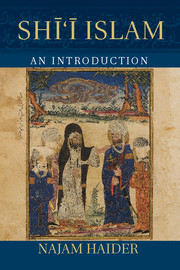Book contents
- Frontmatter
- Dedication
- Contents
- List of Tables and Maps
- Acknowledgments
- Note on the Cover Image
- A Note on Transliteration and Dating
- Maps
- Introduction
- Section 1 Theology
- Section 2 Origins
- 3 Community
- 4 Fragmentation
- Section 3 Constructing Shī‘ism
- Section 4 Shī‘ism in the Modern World
- Appendix Verses Mentioned in the Argument from Qur’ānic Expectations in Chapter 3
- Index
- References
4 - Fragmentation
Published online by Cambridge University Press: 05 August 2014
- Frontmatter
- Dedication
- Contents
- List of Tables and Maps
- Acknowledgments
- Note on the Cover Image
- A Note on Transliteration and Dating
- Maps
- Introduction
- Section 1 Theology
- Section 2 Origins
- 3 Community
- 4 Fragmentation
- Section 3 Constructing Shī‘ism
- Section 4 Shī‘ism in the Modern World
- Appendix Verses Mentioned in the Argument from Qur’ānic Expectations in Chapter 3
- Index
- References
Summary
In Chapter 3, we examined two narratives that hold a special place in the historical memory of the larger Shī‘ī community, the rejection of ‘Alī's authority after the Prophet's death in 632 and the killing of Ḥusayn at Karbala in 680. Both events generated ritual commemorations in Shī‘ī communities, most notably the celebration of ‘Īd al-Ghadīr and the mourning of ‘Āshūrā’. However, Shī‘ī groups differ regarding the implications of these events. The Zaydīs participate in the festivities surrounding ‘Alī's reported appointment at Ghadīr Khumm despite not requiring the explicit designation of an Imām. They also lament Ḥusayn's death without ascribing to it any broad cosmic significance. The Ismā‘īlīs and the Twelvers affirm ‘Alī's formal designation as the Prophet's rightful successor through their celebrations of ‘Īd al-Ghadīr. As for ‘Āshūrā’, the Ismā‘īlīs (Nizārīs) grieve for Ḥusayn, but their mourning is mitigated by the presence of a ruling Imām. This differs from the Twelvers, for whom the remembrance of ‘Āshūrā’ is a central pillar of ritual practice and an embodiment of piety.
In contrast to historical episodes that unite the Shī‘a community, a number of events provide the basis for its fragmentation. In terms of chronology, the first involves the failed revolt of Zayd b. ‘Alī b. Ḥusayn b. ‘Alī b. Abī Ṭālib against the Umayyads in 740. This uprising is routinely interpreted as marking the split between the Zaydīs (on one side) and the Ismā‘īlīs/Twelvers (on the other side). The second centers on the controversial succession to Ja‘far al-Ṣādiq (the sixth Imām and great-grandson of Ḥusayn) in 765. Although this dispute precipitated a break between the Ismā‘īlīs and the Twelvers, variant accounts of the episode suggest a common Ismā‘īlī/Twelver conception of the scope and powers of the Imām. Finally, the disappearance of Muḥammad al-Mahdī (the twelfth Imām) in 874 compelled the Twelvers to reimagine the Imāmate as they struggled to explain the apparent succession of a newborn who was inaccessible to the larger community. In the process, Twelver scholars fashioned a communal identity grounded in a distinctive set of theological beliefs.
- Type
- Chapter
- Information
- Shi'i IslamAn Introduction, pp. 84 - 100Publisher: Cambridge University PressPrint publication year: 2014



